

I haven't heard this one, but apparently it was a big deal, with guest appearances by manguebeat stars Nacao Zumbi and foundational rap legend Afrika Bambaataa; also, soul singer Paula Lima was in this edition of the band.

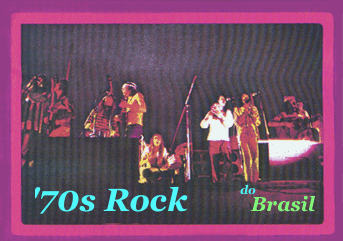
In the 1970s, Brazilian rock'n'roll followed along on several parallel paths, which only occasionally intersected. Many of the groups from the heavily commercialized, early-60s prefab jovem guarda teenybopper scene kept making albums well into the 1970s. Generally speaking, these continued along the pop cover-tunes path of their earlier work, or dipped even deeper into bland pop vocals, as with Roberto Carlos, the king of the scene. Many of the great tropicalia artists who pioneered psychedelic rock in Brazil moved on to become the superstars of the "MPB" scene, which also turned towards an increasingly-ornate pop direction; some -- like Jorge Ben -- delved into funk and soul-flavored groove music.
A handful of artists pursued (more or less) straight-ahead rock music... Many were inspired by the inroads made by the tropicalia movement, but keeping up with the times, they spun off in different directions. Ex-Mutante Rita Lee became something of a stadium rocker, and several prog bands flourished in the mid-'70s, while a few hardcore rockers and psychedelic bands also roamed the land. To be honest, I haven't heard all that many of these records... but as I check them out, I'll add my reviews to the Slipcue site.
Jards Macale - see artist discography
Mamelo Sound System "Mamelo Sound System" (Ybrazil, 2000)


I haven't heard this one, but apparently it was a big deal, with guest appearances by manguebeat stars Nacao Zumbi and foundational rap legend Afrika Bambaataa; also, soul singer Paula Lima was in this edition of the band.
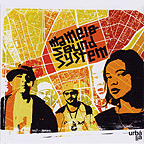 Mamelo Sound System "Urbalia" (Ybrazil, 2003)
Mamelo Sound System "Urbalia" (Ybrazil, 2003)


Monotonous, paper-thin pop/rap/tronica, with a glimmer of crunchy, Linkin Park-ish "alt-rock" guitars thrown in from time to time. These Sao Paulo rappers sound like petulant teenagers, while the music mix is so weak and one-dimensional, it's difficult to care about what they are saying, or where the group belongs in the Brazilian musical landscape. It's a real snoozer-oo. Then again, I'm just a grumpy old man, so what do I know? Perhaps if you like lightweight pop-rap, this is simply brilliant. Da bomb, and all that.
Mamelo Sound System "Operacao: Parcel/Remixalia" (Tratore, 2005)


Mamelo Sound System "Velha Guarda 22" (Tratore, 2006)


Manduka - see artist discography
Marcelo D2 - see artist profile
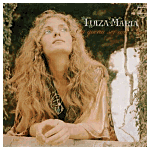 Luiza Maria "Eu Queria Ser Um Anjo" (Philips, 1975)
Luiza Maria "Eu Queria Ser Um Anjo" (Philips, 1975)
(Produced by Sergio de Carvalho)
A cool bluesy boogie-rock, psychedelic album by a husky-voiced gal who could belt it out like Tracy Nelson or Mama Cass, and a compact, all-star session crew backing her up that included Antonio Adolfo on piano, Lulu Santos on guitar, Chico Batera, Rick Ferreira (who also wrote some of the material and did some of the arrangements) and Jim Capaldi (of the British folk-prog band Traffic) pitching in as well. Her voice is a little hard to handle, but the musical backing is cool, sort of similar to Rita Lee's stuff around the same time, but better. The music ranges from spacey, cosmic epics to funky blues jams and delightfully opens with a bluegrassy country number, "Na Casca Do Ovo," which is a style very foreign to mainstream Brazilian pop. Apparently, Luiza Maria went on to sing backup for several stars, notably Tim Maia and Ivan Lins, but other than that I don't know how much of a dent she made in the music scene. This disc is definitely worth a spin, although many listeners may find it a bit grating.
Luiza Maria "Tarantula" (Leblon, 1993)
Marku - aka Marku Ribas
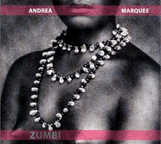 Andrea Marquee "Zumbi" (YBrazil/Stern's, 2000)
Andrea Marquee "Zumbi" (YBrazil/Stern's, 2000)


Trip-hop and soul-tinged pop, with nods to the past such as covers of songs by Caetano Veloso, Jorge Ben and Zeca Pagodinho, as well as a slew of original tunes. Marquee isn't as forceful as fellow soulster, Daude, nor as spazzy as supersinger Daniela Mercury, though that's the general area she's aiming for. This didn't set off any bells for me, but it may be of interest for others looking for contemporary, post-MPB pop that's a little off the beaten path.
Andrea Marquee "Melhores Momentos" (BMG, 2002)

![]() Martinha "Serie Bis: Jovem Guarda" (EMI, 2007)
Martinha "Serie Bis: Jovem Guarda" (EMI, 2007)

Martinha "Como Antigamente" (Warner, 1974)

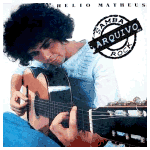 Helio Matheus "Helio Matheus" (RCA-Victor, 1975) (LP)
Helio Matheus "Helio Matheus" (RCA-Victor, 1975) (LP)

Easygoing '70s pop with funky, fusion-y roots -- sort of like what Michael Franks might sound like, if he grew up in Rio. Helio Matheus is the vocalist, but the ensemble backing him includes all the key members of the jazz band Azymuth, including keyboardist Jose Roberto Bertrami. Matheus can be considered part of the groovy-smooth "samba rock" sound of the '70s, and this disc has a pleasantly eclectic vibe -- I'm not a huge Azymuth fan, but compared to their other albums, it's a gem. Light, sweet pop that crosses over with the bossa and Rio funk scenes... For folks who are more into fusion-pop than I am, this would certainly be an album to track down. The second half of the album settles -- surprisingly -- into a folkie sort of vibe, even reminding me at times of Glen Campbell which, strangely enough, I mean as a compliment. The biggest surprise on this album was his cover of "Mi Secreto," a gorgeous romantic ballad that I know from Dominican singer Leonardo Paniagua, here translated as "Meu Segredo." What a trip!
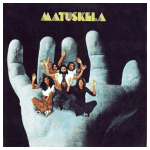 Matuskela "Matuskela" (Chantecler, 1973)
Matuskela "Matuskela" (Chantecler, 1973)
One of those weird, wonderful gems from the hippie era, an eclectic folk-prog set packed with acoustic and electric guitars, bongo drums, odd, primitive synthesizer riffs and urgent, yearning, earnest vocals. Although a few regional instruments creep in around the margins, this record lives mostly in a non-Brazilian sphere, a straight-up acid-rock set with echoes of Van Morrison, Santana, The Beatles and Iron Butterfly intertwined in a clunky but charming progadelic vibe. There's a lot of stylistic variety, bound together by a spacey, noodly experimentalism -- if you enjoy Alceu Valenca or Ze Ramalho's earliest albums, you might want to check these guys out as well.
Ney Matogrosso - see artist discography
Ruy Maurity - see artist discography
Jorge Mautner - see artist discography
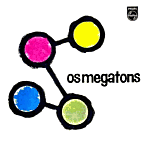 Os Megatons "Os Megatons " (Philips, 1964)
Os Megatons "Os Megatons " (Philips, 1964)
Twangy, jangly surfin' rock instrumentals, also with a Shadows-esque tone. To be honest, the lead guitarist(s?) weren't really all that good, but even if they lacked finesse, the band still sounded cute, and they were competent rockers. Like many Brazilian rock bands of the era, I wish they had sung in Portuguese... But I felt the same way about the Shadows as well...
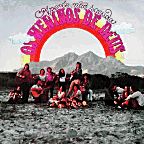 Os Meninos Do Deus "Aperte...Nao Sacuda!" (1974)
Os Meninos Do Deus "Aperte...Nao Sacuda!" (1974)
Rock and psychedelic-tinged gospel music from the tropicalia era of Brazilian pop. A modest gospel chorus melds well with Bowie-esque guitar, folk-rock and '70s-style pop; there's a clear debt to Hair and other hippiesque gospel-pop of the time. Overall, this is quite nice, a good mix of perky, earnest innocence and musical accomplishment. Like Communidade S8 (another Brazilian religious group that put out records around the same time) Meninos Do Deus were a musical band affiliated with a larger religious organization, in this case, the Children of God, a creepy, hippie-ish evangelical group from America that had cultish, apocalyptic overtones and was notorious for various sexual practices, including "flirty fishing" (having young women sexually seduce new converts, and find financial "donors" for the cause) as well as allegations of child abuse. If the evangelical angle (and the other stuff) doesn't bother you too much, there are some nice poppy songs on here, although the history behind the music is pretty disturbing. I don't know how much these particular Brazilian musicians were involved in the politics or lifestyle choices of the international organization, although you can read more about them in this post on the Brazilian Nuggets website
Os Meninos Do Deus "Amor Nunca Falha -- Capitulo 2 " (Polydor, 1975)
![]() Mestre Ambrosio "Mestre Ambrosio" (Tratore, 1997)
Mestre Ambrosio "Mestre Ambrosio" (Tratore, 1997)

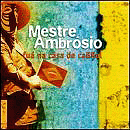 Mestre Ambrosio "Fua Na Casa De Cabral" (Sony/Chaos, 1999)
Mestre Ambrosio "Fua Na Casa De Cabral" (Sony/Chaos, 1999)

Challenging modern music from this youthful mangue beat band out of Recife. A truly weird, psychedelic, distorted take on the street samba sound, mixing spacy electric guitars with clattering percussion and other non-rock instruments, such as pife flutes, an accordeon and a violin, and a wild mix of rock, forro, maracatu and other styles. It's kind of like hearing the Quinteto Violado on acid. (I bet they're amazing live.)
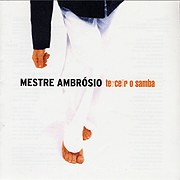 Mestre Ambrosio "O Terceiro Samba" (Sony, 2001)
Mestre Ambrosio "O Terceiro Samba" (Sony, 2001)

(Produced by Beto Villares)
Their third album... another odd, compelling offering from this eclectic regional band... This time around their sound is much more stripped down, in some ways even static, yet the combination of a modern sensibility with antiquated regional styles such as coco and maracatu makes this album sound unique and fresh... The instruments are all acoustic, with a scratchy violin at the center of many songs, and a bit of accordion and forro-style percussion... You can tell instantly that this is a modern band, but their approach is so unlike their rock and samba-oriented contemporaries that it's really quite delightful... Highly recommended!
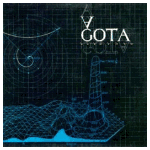 Metro "A Gota Suspensa" (Underground, 1983) (LP)
Metro "A Gota Suspensa" (Underground, 1983) (LP)

The independently-released debut album by this '80s new wave group originally came out under the band name A Gota Suspensa, but they changed to Metro after signing with a major label, and the album got retitled retroactively... The original lineup included lead singer Virginie, who quit the band a few years later when they started to change their sound.
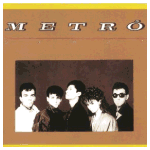 Metro "Olhar" (CBS, 1985)
Metro "Olhar" (CBS, 1985)

This was Metro's big hit album, and it's a pretty good -- at least better than average -- slice of genuine, uptempo Brazilian new wave. It's a strong showcase for Virginie's lead vocals, giving the record a real Romeo Void/Human League feel -- more keyboard-y than synthy, poppy and propulsive, but not brooding or fey. In a scene that was so derivative and less accomplished than their US or UK peers, this is an album that stands out for its vigor and pop appeal. Definitely worth checking out if you're interested in exploring this wing of Brazilian pop.
Metro "A Mao De Mao" (CBS, 1987)

I think this was the album that came out after group's original lead singer split off to form her own band, Virginie & O Fruto Proibido... Haven't heard it, though.
Metro "Deja-Vu" (Trama, 2002)

On this reunion album (which I don't think included their singer-gone solo artist Virginie) the remnants of Metro are joined and celebrated by younger artists such as Preta Gil and Otto, as well as old-timers like Jorge Mautner...
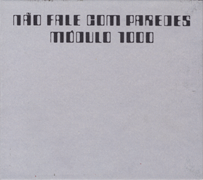 Modulo 1000 "Nao Fale Com Paredes" (Top Tape, 1970)
Modulo 1000 "Nao Fale Com Paredes" (Top Tape, 1970)


I have a somewhat suspicious mind, so when I finally got around to checking out this "legendary lost album" from the early 1970s, I immediately wondered if it was a hoax... I mean, here was a wild-sounding psych-prog/heavy rock group from the tropicalia era that, for all its clumsiness, kind of blows the big name artists such as Os Mutantes and Caetano Veloso out of the water, at least in terms of being a real, live cutting-edge, contemporary hard rock band. The crude, cutting, wailing, electric lead guitar, the sludgy, Sabbath-esque proto-metal riffs, the gutteral, faux-liturgical vocals and the deep plunges into tranq-rock territory are so blazingly authentic and so completely divorced from what 99% of the rest of Brazil was into, it's really quite remarkable. This Rio-based band was in touch with elements of the American-British hard rock scene that loftier artistes such as Veloso and Gilberto Gil had little interest in. Crunchy, grungy, sloppy bands such as Steppenwolf and Iron Butterfly seem as much a part of their palatte as do Hendrix and krautrockers like Can -- I'm not saying this is great music, or that I'd really want to listen to it on a rainy day at home, but it's got a lot of historical heft, in terms of it's hipness, relative to what was happening elsewhere in the world. If you're into freaky acid rock from the 'Sixties and 'Seventies, you'll want to check this one out. (PS - oh yeah, by the way, it's not a hoax. For more info, contact the reissue label, World In Sound.)
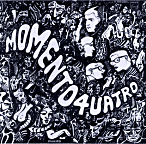 Momento Quatro "Momento Quatro" (Philips, 1968)
Momento Quatro "Momento Quatro" (Philips, 1968)
(Arrangements by Rogerio Duprat)
Wow. Really. This is a cool sunshine-pop album with group vocals by a quartet featuring Ze Rodrix and Ricardo Sa (two-thirds of the later group called Sa, Rodrix and Guarabyra) along with Mauricio Mendonca and David Tygel (who later co-founded the pop band Boca Livre...) It's a lively set with perky, pleasantly orchestrated arrangements courtesy of tropicalia maestro, Rogerio Duprat. Duprat doesn't spend a lot of time trying to be clever of trip us all out; he just provides a fun set of orchestrations that give a fun, sympathetic backing to the group's lovely songs. It's kind of like The Association meets Tom Jobim... Recommended!
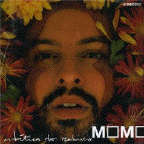 Momo "A Estetica Do Rebisco" (Dubas, 2007)
Momo "A Estetica Do Rebisco" (Dubas, 2007)


(Produced by Marcelo Frota)
An unusual and totally atypical Brazilian rock album, drawing heavily on the space-rock and soft-prog sounds of the early 1970s. Bowie, Syd Barrett, the gentler side of Pink Floyd and a gazillion less well-remembered psychedelic strummers of that era are evoked in this gentle, diffuse album, a collection of spaced-out songs that is unlike any other Brazilian record I've ever heard. (Perhaps Otto's trip-hoppy electronica comes closest...) Singer/keyboardist Marcelo Frota is the main creative force, although several of the songs are co-written with others (anyone know if co-composer Alvinho Lancellotti is related to Domenico Lancellotti, of the Moreno Veloso/+2 crew? Just wondering.) It's nice stuff: folks who dig Davendra Banhart and his brand of freak-folk might also get a kick out of this odd, dreamy disc. Worth checking out!
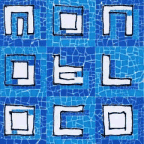 Monobloco "Monobloco 2002" (Universal, 2002)
Monobloco "Monobloco 2002" (Universal, 2002)

A lively batucada percussion-oriented offshoot of Pedro Luis E A Parede... This popular Rio band mixes soul-samba, rap and rock influences, all woven into a drum-heavy mix. Where Olodum's pop crossovers seem anchored in the 1980s, Monobloco are way more modern. Definitely worth checking out.
![]() Monobloco "Ao Vivo" (Som Livre, 2006)
Monobloco "Ao Vivo" (Som Livre, 2006)

![]() Monobloco "Ao Vivo" (DVD) (Som Livre, 2006)
Monobloco "Ao Vivo" (DVD) (Som Livre, 2006)

A video version of the live album from 2006... Includes opening and closing numbers that are not on the CD.
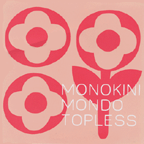 Monokini "Mondo Topless" (Bizarre, 1998)
Monokini "Mondo Topless" (Bizarre, 1998)

(Produced by Paulo Beto Na Lobo)
Yay...! A Sao Paulo rock band with some nice, uncomplicated hipsterrific indie-pop, which ranges from bouncy, brainless power-pop to Bacharach-tinged Stereolabbiness... Very much in keeping with all the twee stuff that was going on in the UK and US around the same time. If you like artists such as Stereo Total, April March or Die Moulinettes, then this disc is for you. Extra points for keeping the lyrics (when there are lyrics) in Portuguese... Much appreciated!
Marisa Monte - see artist discography
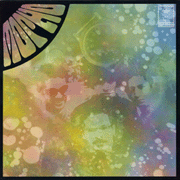 Mopho "Mopho" (Baratos Afins, 2000)
Mopho "Mopho" (Baratos Afins, 2000)
Cool stuff! Definitely off the beaten track as far as Brazilian pop goes... indiepop isn't really big in Brazil, and the hometown bands are incredibly hard to track down, even down there. This is fairly trippy, psychedelia-tinged power-pop that seems to take its cues from old George Harrison and Badfinger albums, with a touch of "heavier" rock ala Rod Argent and the like. Although this Sao Paulo band has its limitations, it's still pretty fun to hear these old '70s boogie rock and lush, Beatles-y pop riffs fronted by Portuguese vocals. Several songs are catchy and stand up on their merit -- lighthearted, dreamy, and definitely worth checking out either as an indie fan or as a Brazilian rock buff. (NOTE: the Baratos Afins record store, which put this album out, is probably the only place you're likely to find this album. Check out their website from the link above for mailorder info, as well as info on other Brazilian indie bands. Mopho is also profiled in an online article in the Brazilian e-zine PopBook.)
Paulinho Moska - see artist discography
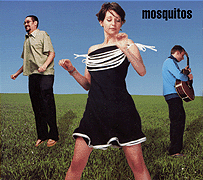 The Mosquitos "Mosquitos" (Bar None, 2003)
The Mosquitos "Mosquitos" (Bar None, 2003)


An absolute delight. Finding the perfect midway point between Brazilian cool and sugary indiepop twee, New York's Mosquitos feature vocals by Juju Stulbach, a Rio-born expatriate who combines the airy, insouciance of Astrud Gilberto with the flip, casual, DIY mellowness of the North American cutesy-pop crowd. There's a relaxed love of melody that suggests a debt to Yo La Tengo, as well as a simplicity and cleanness of line that brings The Bats to mind... Stulbach's Portuguese-language vocals are a highlight, with a fluidity and good-natured tone that should draw in any devotee of classic, roller-rinky Brazilian pop, as well as fans of BMX Bandits, Beat Happening and the whole Pacific Northwest lo-fi scene. Admittedly, the cutesy, naifish English-language lyrics of singer-guitarist Chris Root don't hold up as well to repeated listenings, but they put the record into the right context... In short, this is the perfect twee-pop album that native Brazilian indie bands have yet to create: it's lovely and dreamy, full of pretty sounds and foreign words... and I like it a lot!
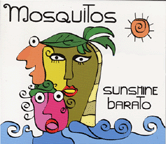 The Mosquitos "Sunshine Barato" (Bar None, 2004)
The Mosquitos "Sunshine Barato" (Bar None, 2004)


This disc continues on the much same path as the first Mosquitos set, though perhaps with more of an indiepop inclination, but the Brazilianness is still there, too. Perhaps because they are now a known quantity, this disc is a little less striking than its predecessor, but it's still pretty cute and pretty cool. A fun splash in the sun, with lots of perky melodies and catchy, playful hooks.
![]() The Mosquitos "III" (Bar None, 2006)
The Mosquitos "III" (Bar None, 2006)


Alas, this one fell a little flat for me... Mostly just a generic indie-rock album, with little "Brazilianness" to it, including a big tilt towards English-language lyrics. It's okay, but not as creative or as fun as their first album. Alas. Maybe another record will come out someday?
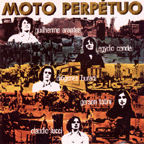 Moto Perpetuo "Moto Perpetuo" (Warner, 1974)
Moto Perpetuo "Moto Perpetuo" (Warner, 1974)

(Produced by Peninha Schmidt)
A noteworthy pop-rock album, featuring contributions from songwriter (and future solo artists) Guilherme Arantes and guitarist Egidio Conde (who later joined the experimental band, Som Nosso De Cada Dia).
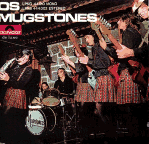 Os Mugstones "Os Mugstones" (1967)
Os Mugstones "Os Mugstones" (1967)
This kilt-clad combo crafted a kooky mix of frat rock, Viscounts-ish instrumental pop, and some genuine Brazilian freakbeat gems. The lackluster instrumentals outnumber the rock tunes, but they don't outweigh them: the handful of groovy rock songs definitely make this disc worth checking out.
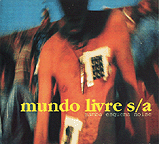 Mundo Livre s/a "Samba Esquema Noise" (Banguele, 1994)
Mundo Livre s/a "Samba Esquema Noise" (Banguele, 1994)


The debut album by one of the key bands in Pernambuco's explosive 1990s manguebeat scene... This is an exuberant, uninhibited mix of styles -- funky, guitar-based indie/alt rock, electronic noise and regional Brazilian styles... The tilt towards aggressive, electric rock makes this a little on the loud side for an old geezer like me -- or at least it's not the kind of loud, aggressive rock music that I'm normally into -- but there's still an wild, vibrant creativity at work here that'll make you sit up and pay attention, as well as some quieter moments that are a nice change of page. Percussionist (and future solo performer) Otto was part of the crew in this early edition of the band. Worth checking out!
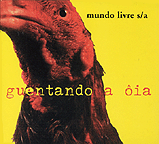 Mundo Livre s/a "Guentando A Oia" (Excelente, 1996)
Mundo Livre s/a "Guentando A Oia" (Excelente, 1996)


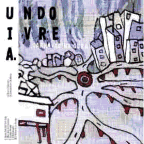 Mundo Livre s/a "Carnaval Na Obra" (Abril/Excelente, 1998)
Mundo Livre s/a "Carnaval Na Obra" (Abril/Excelente, 1998)


Soulful, accomplished '90s alt-rock, with a heavy, funk-drenched approach and an interesting blend of traditional influences. Airy-voiced lead singer "Zero Quatro" bears a more than passing similarity to the great Caetano Veloso, not just in his nasal-yet-suave drawl, but also in his eclectic musical approach. Sometimes the band sits on a groove a little too long, letting things grow static, but overall this is a pretty impressive effort. The use of the cavaquinho next to a heavy soul snare drum is especially nice. Definitely worth checking out, if you're curious about the more modern-sounding Brazilian bands.
Mundo Livre s/a "Por Pouco" (Abril, 2000)


Mundo Livre s/a "Bebadogroove, v.1" (Tratore, 2006)


Mundo Livre s/a "Mundo Cao" (Som Livre, 2007)


Mundo Livre s/a "Combat Samba" (DeckDisc, 2008)

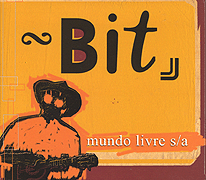 Mundo Livre s/a "Bit (Box Set)" (Deck Disc, 2004)
Mundo Livre s/a "Bit (Box Set)" (Deck Disc, 2004)

A 4-CD box set which includes reissues of their first four albums -- Samba Esquema Noise, Guentando A Oia, Carnaval Na Obra, and Por Pouco -- along with an added disc of video material. Unlike many Brazilian rock boxes, this isn't just a repackaging of regular jewel-box CDs, but rather a floppy fold-out cardboard thingie, with an additional booklet of liner notes and written material. Good introduction to the band!
Os Mutantes - see artist discography
Brazilian Rock - Letter "N"



Other Brazilian Styles
Main Brazil Index
